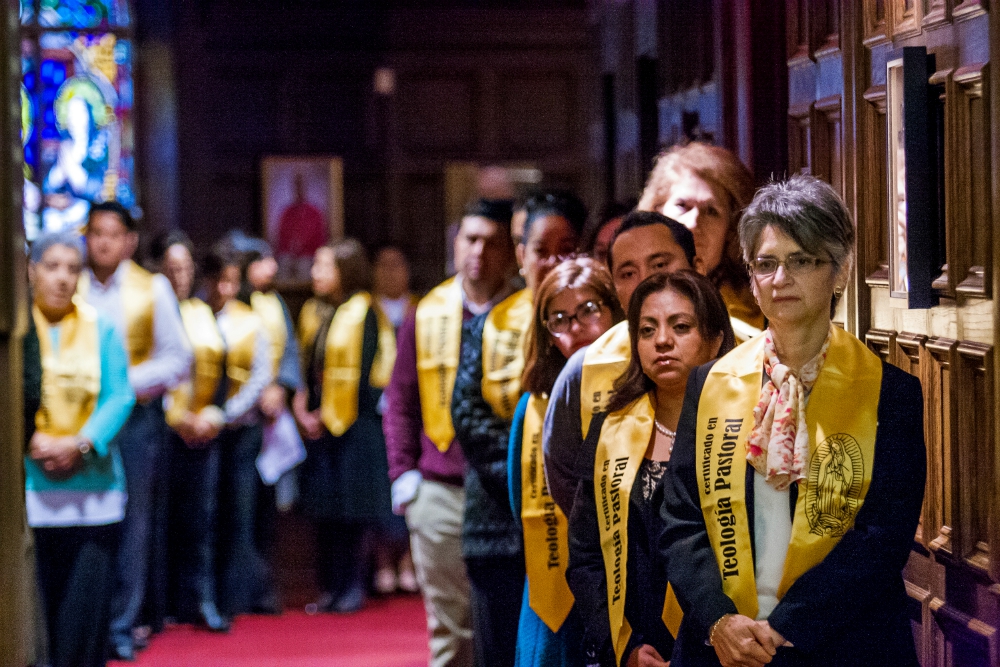
Lay students receiving a pastoral theology certificate in Spanish line up before Mass and a graduation ceremony in January 2016 at Holy Spirit Church in Atlanta. (CNS/Georgia Bulletin/Thomas Spink)
It's easy to see the life-threatening natural and human-produced dangers around us. Like Isaiah of the unclean lips and the self-described sinful fishers, it's easy to let ourselves be paralyzed when confronting powers beyond our comprehension.
Remember, the call to faith begins with the words, "Do not be afraid." The rationale for acting with audacious courage comes from the fact that we know we cannot do it with our own power.
Isaiah's vision included two questions: "Whom shall I send? Who will go for us?" All Isaiah needed to do was offer. Without any clue about what was to come, the intense awareness of goodness he experienced impelled him to say, "Here I am!" That transformed him from spectator to prophet.
The same goes for the fishermen. Jesus said, "Do not be afraid, you are on the brink of transformation." They could share his mission and they were only required to allow God to work through them.
As in the days of Isaiah and Peter, God continues to be the great seeker, lover, even, as Jeremiah said, a seducer (Jeremiah 20:7). The God of Jesus wants us, all we are, in the depths of who we are. The God of Jesus depends on simple human messengers who are willing to be overwhelmed and transformed and sent.
When the experience of evil feels as palpable as the mysterium, we may well be afraid. Yet, our very distress constitutes the call to stand up against destruction and injustice.
We're not called to do it alone. All we need is to say, "Here I am. Send me!" The sender will handle the rest.
What speaks in the depths of silence? What whispers through the void when words fail us? How do we hear God in the spaces between breaths, in moments when language crumbles under the weight of human suffering?
These questions feel particularly urgent today as we witness the devastating conflicts in Gaza and Ukraine, wildfires and mass shootings across America, and ongoing global crises of all kinds. Our flood of words—racing through social media, echoing in empty streets, crying out in protest—seems to grow hollow with each passing day. Our language has become a brittle shell, too fragile to hold the magnitude of our collective grief. Yet, in this poverty of words, there is an unexpected wealth: the profound presence of silence.
This silence is not the peaceful absence of noise so often celebrated in spiritual retreats, but something far more complex and powerful: a silence that could both wound and heal, oppress and liberate.
I do not romanticize silence nor treat it as a cure-all. The silence imposed upon victims of abuse, colonialism, racism and gendered violence is not the silence I advocate for. Rather, I argue that theology—and public discourse more broadly—must learn to distinguish between silencing and silence. The former is coercive; the latter can be transformative.
As a Catholic theologian, I explore silence not just as the absence of sound but as God’s own language: a divine tongue speaking through the empty tomb of Jesus, the speechless grief of his disciples and the trembling joy of resurrection. The theological framework of my research weaves together two main threads: first through the Christian mystical tradition of voices like Evagrius Ponticus (345–399 AD) and Hadewijch of Antwerp (Born: 1200), who knew the terrible beauty of divine silence; then through contemporary suffering, from the collective grief of South Korea’s ferry disaster (2014) to the defiant quiet of marginalized women and the paradoxical joy found in spaces of loss.
"Go out into the deep." Think about it, that's what the son of a carpenter said to professional fishers. They did it, perhaps just to humor him — and took in the biggest catch of their lives. A fluke? A trick? Or a sign of things to come? Whatever, it overwhelmed them.
Does anything overwhelm us today? When we can talk face to face with someone across the world, fly anywhere we wish, and carry phones and watches that effectively replace TV, libraries, computers, cash and credit cards, what can really astonish us?
Surely, we're terrified at the power of hurricanes, tornadoes and wildfires — at least if we experience them in person. We could add any number of other dangerous things that cause everything in our heart, mind and body to panic and concentrate on how to save ourselves or our vulnerable loved ones. This kind of being overwhelmed is rooted in fear.
There's another realm of mystifying experiences that awakens an awe that moves our guts like fear, but differently. For lovers of Latin, it's called mysterium tremendum et facinans, an awesome, fascinating mystery. This is no rational experience, but a breathtaking and irresistible awareness of the presence of the beauty, immensity and truth of the divine.








